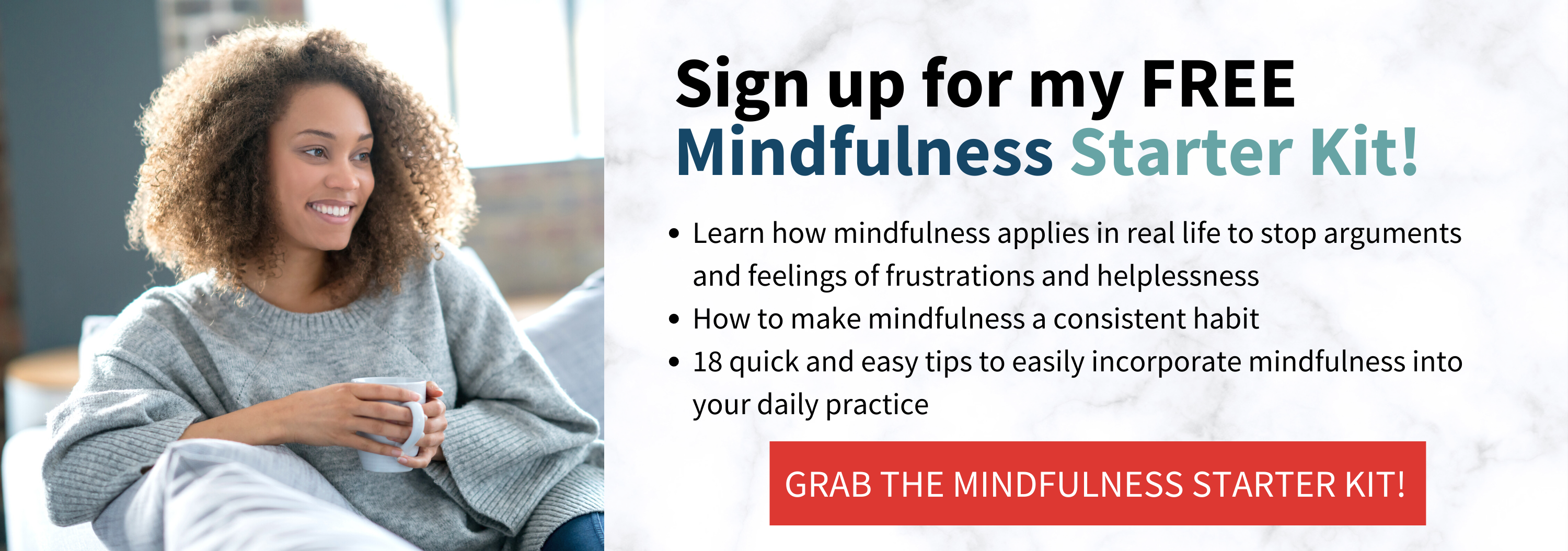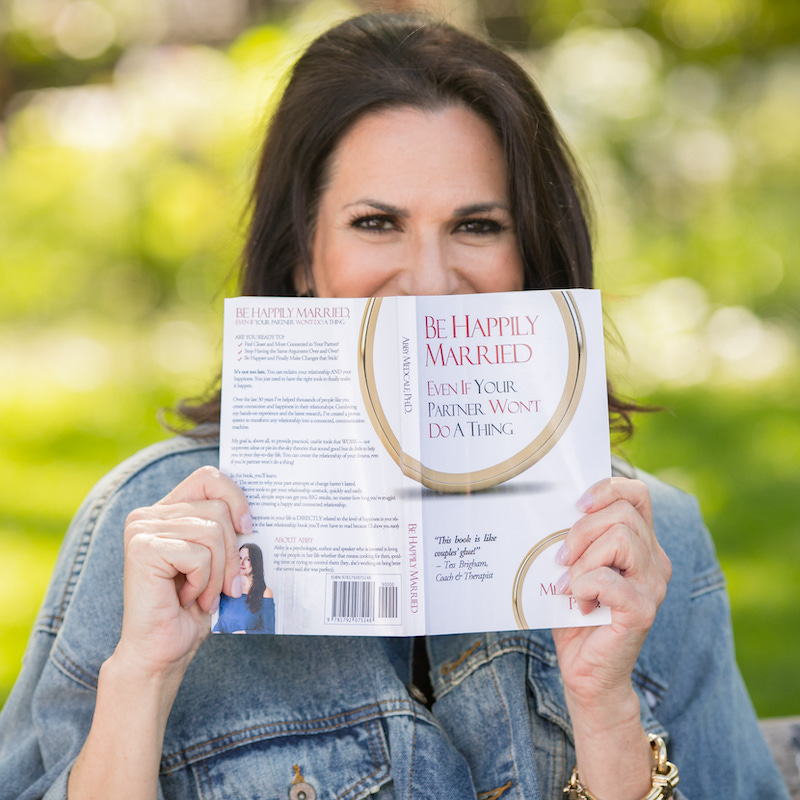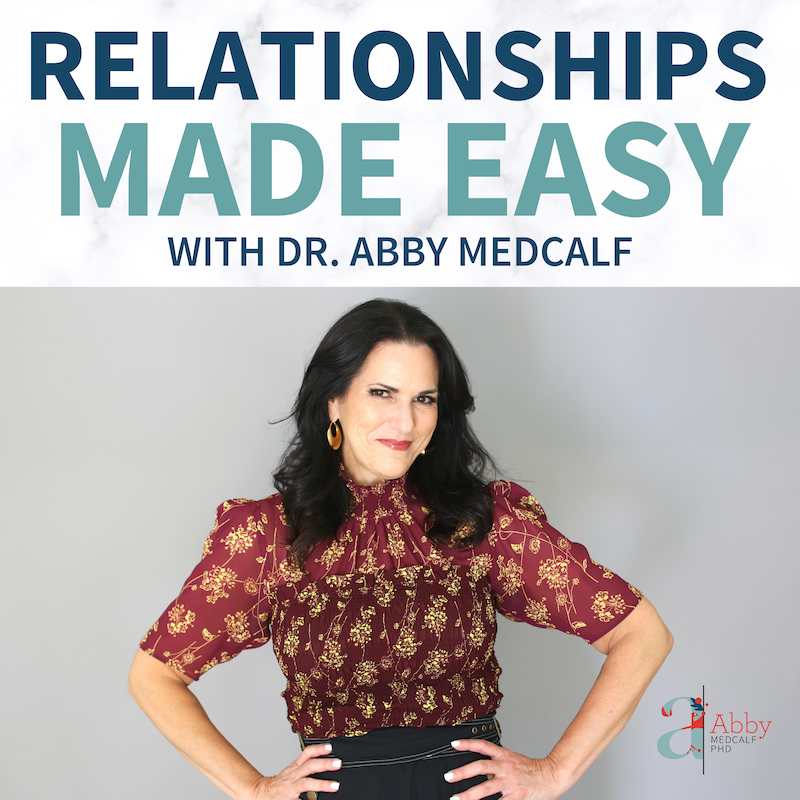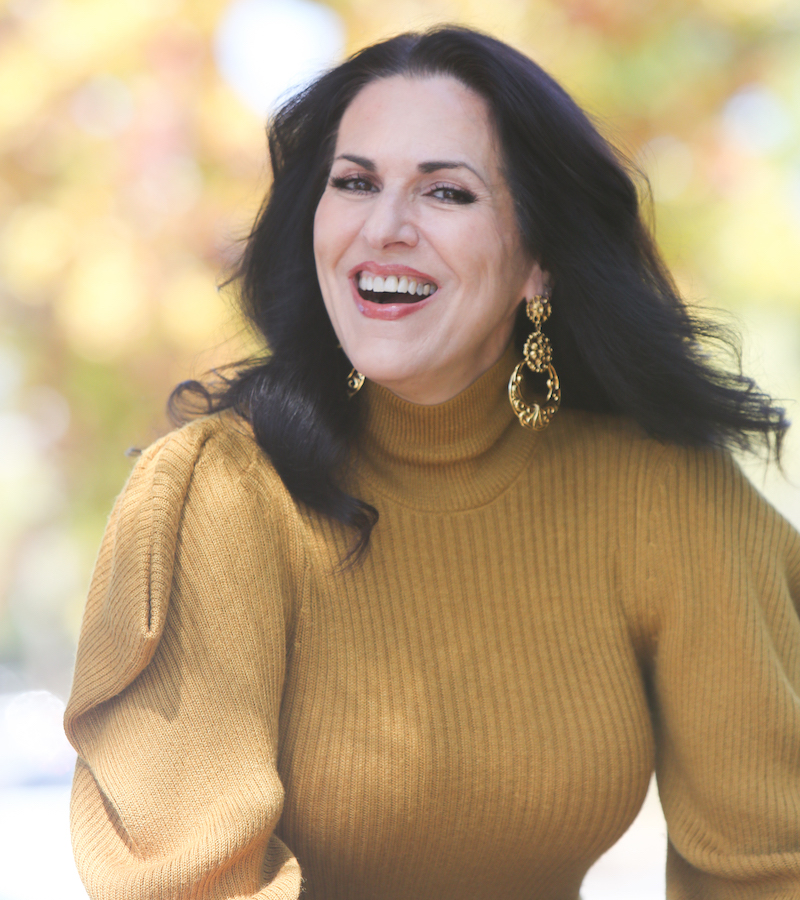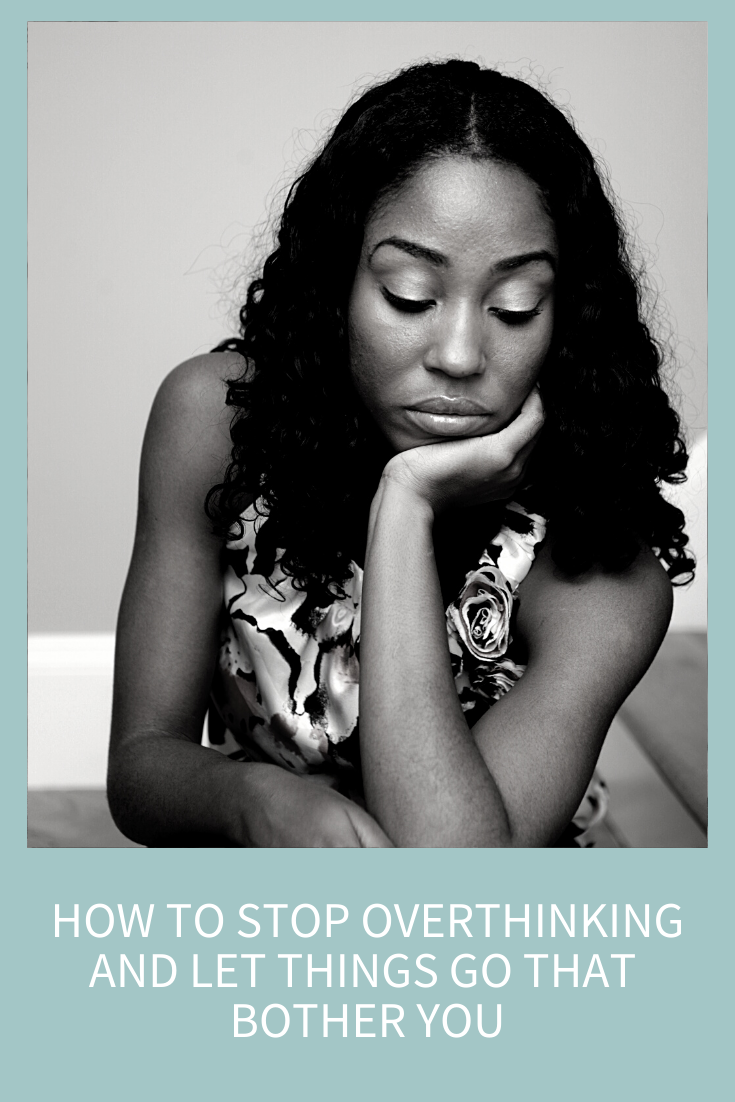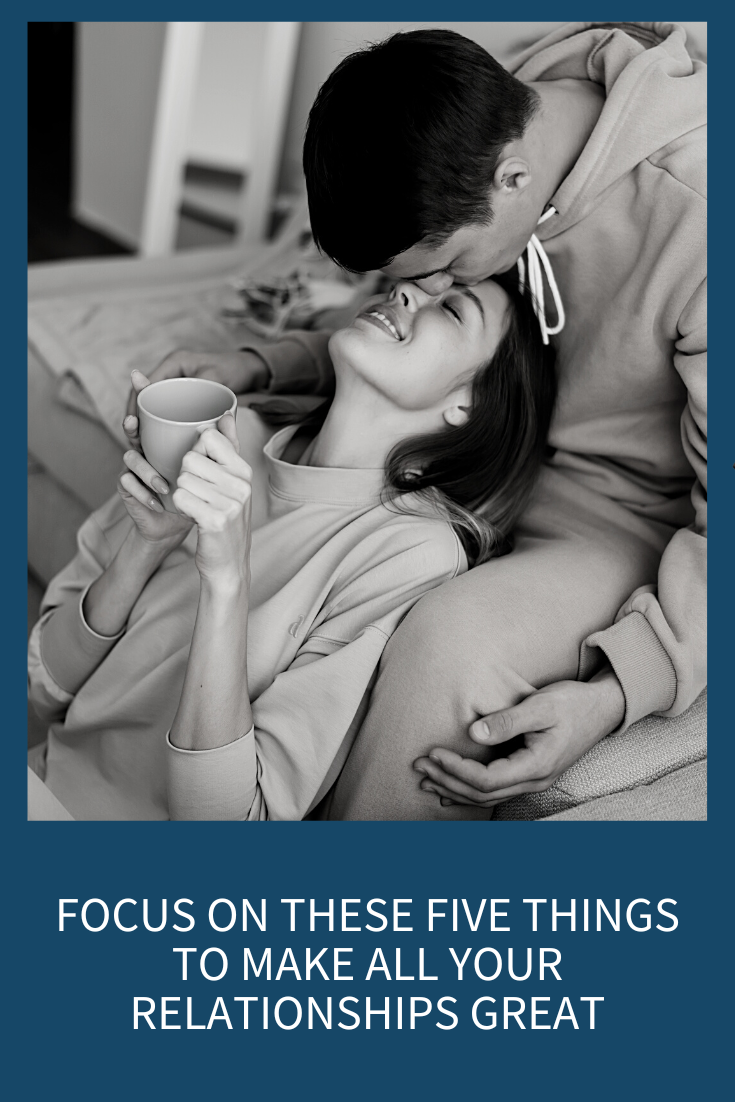
We know from the research that the biggest predictor of a happy (and long!) life comes down to the quality of your relationships. And, as much as we all want to focus on romance, there are many important relationships in your life that deserve your intention and attention. Today, I’m going to teach you the five philosophies to focus on to create fulfillment, peace, and joy in all your relationships.
13-minute read
#1: Focus on Your Boundaries
I’ve been hearing stories my whole life about what a happy baby I was. Apparently, I came out of the womb smiling and never gave my family a moment’s bad time. Sure enough, there are multiple pictures documenting this happy baby phenomenon.
When I told a past therapist about what a great baby I was (it was one of those “in passing” comments that then became the center of the next five sessions), she said, “Wow. That must have been hard. That’s a lot of pressure for a kid.”
What?!?!
In our ensuing sessions, I discovered that she was right. From the very beginning, I was set up to be the smiling good girl. So, on the outside, that’s all I ever was. I said “yes” and was amenable all the time. I was always willing to “pitch in” and lend a hand, and I could always be counted on to volunteer first or be the one who spearheads tomorrow’s important meeting.
All of that looking good on the outside came at a cost. I unconsciously learned that my own needs weren’t as important as others and that my worth was tied up in being that “happy girl” who always said yes. I kept the smile on my face but pulled myself farther and farther from people emotionally. I felt isolated and unworthy, which culminated in a drug addiction that I hid from the world.
I wasn’t happy when I said yes all the time. In fact, I was angry and frustrated a lot with the people around me. I acted like a victim in my life and said things like:
- “My mother made me come over to help set up the party even though I didn’t want to.”
- “I couldn’t come to dinner because my boss made me stay late.”
- “I was in a good mood, but then my partner came home in a pissy mood, so it ruined my night.”
I could go on. I blamed other people for my unhappiness over and over again, and in the end, it was because I didn’t hold boundaries with these people.
Today in my life, I say no often, and I am happy. What I’ve learned in these last couple of decades is that saying no actually makes me vulnerable, which makes me more real and accessible to the important people in my life. In other words, saying no has improved all my relationships (most notably the one with myself), and I’ve become happier and more satisfied in my life. Instead of being a victim to other people’s moods, actions, and requests (which left me feeling resentful, misunderstood, and unappreciated), I became a proactive partner with others, which has left me feeling connected and peaceful.
What I’ve come to learn in the last (almost four) decades of working with others is that boundaries are the answer to all the different questions you’ve been asking:
Q: How can I feel more connected to my partner?
A: Boundaries
Q: How can I improve my communication skills?
A: Boundaries
Q: How can I be happier in my life?
A: Boundaries
Q: How do I take control of my life?
A: Boundaries
Q: How can I feel less anxious or depressed?
A: Boundaries
Q: How can I find more balance and serenity in my life?
A: Boundaries
Q: How can I feel less overwhelmed and turn off my inner critic?
A: Boundaries
The answer to almost any question you ask about how to be happier or better skilled in some area of your life is to have and keep your boundaries. If you’re upset, it means you need a better boundary (internally or externally). And, if the other person is upset, it means you should have made this boundary sooner.
I’ve finally finished the first draft of my book on boundaries, and it’s with my editor now, so I’m very hopeful you’ll have a copy in your hands within the next two months. Until then, I’ve got some wonderful past episodes of the podcast you can review.
Want to feel happier and more connected in your relationship? Buy my #1 bestselling book on Amazon, Be Happily Married: Even If Your Partner Won’t Do a Thing!
#2: Focus on Making Yourself Happy
Closely related to #1, it’s time to understand that your happiness isn’t about how other people act. It is not your partner’s job to make you happy. It’s not your mom’s job to make you happy. You should make you happy. In fact, you’re the only one who can make you happy. Everything else is just a temporary fix.
It’s so common to say things like “She drives me crazy” or “He made me so mad” because, despite all the stuff we know, we still think it’s possible for other people to “make” us feel things. Eleanor Roosevelt famously said, “No one can make you feel inferior without your consent.” But really, this line should be, “No one can make you feel without your consent.” In other words, other people do what they do, but our reactions are our own responsibility. It’s not their “fault” that we’re angry, sad, lonely, or impatient.
Because we tend towards this way of thinking, the next logical step is to think that our partner, friend, or sibling could (or should) make us happy. You never want to look at something outside of yourself to make you feel happy. This includes things like food, drugs and alcohol, buying new things, social media or video games, and it certainly includes other people. Other than a brief, momentary gain, none of these things do the trick. Expecting others to be the source of your happiness is one of the most common ways we look outside of ourselves to “fix” or elevate our mood.
It’s time to take 100% responsibility in your life and relationships and figure out what you need to feel satisfied, confident, peaceful, and content in your life. It’s an inside job, so stop giving it to people outside the company.
Do you say or think things like:
- If I had more money, then I’d be happy
- I’m not going to be happy unless I have kids
- If I change jobs, then I’ll be happy
- If my partner would only go to therapy, then all my problems would go away
When you notice any of these thoughts (because you’re so mindful after listening to me yammer about it for so long), stop and ask yourself: What do I need to do to be happier/more peaceful in this moment? And then take just one small step in that direction.
#3: Focus on Being Kind, Not Fair
I love to cook, but sometimes, when I need to get dinner on the table and I’m tired, I don’t feel like it. It’s at these times that I take a minute and remember why I’m cooking a healthy meal for them. It’s because I want my kids to have good nutrition. It’s because I want them to feel loved and prioritized. It’s because I enjoy sitting together, even for 10 minutes, and connecting.
Now, I’m not saying I never order in food (I don’t need to be a martyr), but most of the time, I stop and gather myself and think about my why when I’m doing something for my kids or Gary. For me, it helps to have a mindset of being kind to them. I remember that my kids are going to be gone one day (and that day is scarily close), and these are moments to cherish.
I do the same thing when Gary leaves hairs in the sink after shaving. Yes, he rinses the sink, but not to my standards. So, I often give the sink an extra rinse once a day (or however often he shaves) and do it with a sense of love instead of annoyance. I do it with the inner thinking of, “I love my man, and this is a small thing I can do to support him and me. It’s really nothing that takes literally seconds and will add to the well-being of our relationship.”
So many things we get upset about can be avoided with this simple philosophy. It’s a change in focus. It’s leaving the “but it’s not fair” attitude behind and moving toward being kind.
Generally, there’s a “tone” in relationships around fairness and what’s “right.” This focus creates frustration, high expectations, anger and, most damaging, controlling behavior. Yes, there are responsibilities and tasks that need to happen in a relationship, but I want you to stop and take a minute and think about what’s most important in your world.
Instead of focusing on what’s fair or right, I want you to focus on patience and kindness. I want you to set an intention of kindness often. From this mindset, you’ll be more self-aware, relaxed, and thoughtful. Your relationships will transform.
When you’re in a state of what’s “fair,” you’re in a controlling mind frame. When the people around you feel like you’re trying to control them, they act passive-aggressively (or just plain aggressively), get defensive, ignore you, or any number of other behaviors you don’t like. If you think about it, when someone is trying to control you, you probably act just like they do.
Stop focusing on being right and start focusing on being kind. The key to this is to remember to be kind to yourself also. It’s not kind to simply do things for others and never for yourself. How do I know if I’m being kind or codependent? It’s in how I feel.
I recently took a few weeks off from this podcast. Normally, I take two weeks off between seasons, but I was feeling especially drained, so I made it three weeks. Yes, I want to be there for you, but I have to be there for myself first. I was noticing that when I thought of doing the podcast, I was actually starting to feel resentful and irritated. It was enervating me, and I was left feeling overwhelmed and disconnected.
However, after a few weeks off, I was suddenly having tons of ideas for the podcast. I was missing you! I couldn’t wait to get back to writing and recording. At this very moment, I’m feeling like my usual inspired and excited self!
When you’re doing too much for others (aka, being codependent), you feel resentful, irritated, angry, hopeless, helpless, frustrated, and anxious. This is how you know you’re not coming from balanced kindness.
#4: Focus on Feelings, Not Facts
We connect with feelings, not thoughts or facts. I’ll say that again. You connect with others through what you’re feeling, not what you’re thinking. Whether you’re struggling with someone at work or in your personal life, focusing on feelings will always get you to more amenable ground.
What I generally see when two people are misunderstanding one another or arguing is that they’re each trying to lay out the facts as they see them. There’s some idea that there’s a right and a wrong, and I just need to convince you of how right I am. However, this rarely gets you anywhere. Sure, you might be able to come up with some agreed upon solution but, in my experience, someone is always mad or resentful at the end because they still don’t feel heard or seen.
Instead, if you stop and focus on feelings in these moments, you’ll find connection and a more reasonable path forward. Literally stop and ask the other person in a moment, “How are you feeling right now?” The vast majority of the time, they’ll stammer and give you what they’re thinking, but if you stick with it and push for a feeling, you’ll find results.
Stop and ask yourself the following questions:
- “What am I feeling right now?”
- “What thought or belief am I having right now that’s making me feel this way?”
- “What else could be true? What’s a better-feeling thought I could have right now?”
- How do I want to feel in my relationship?
- “What’s one thing I could do or think to create that feeling in my relationship?”
#5: Focus on Unconditional Acceptance
When I meet with individuals or couples, it’s generally clear that there’s love in the various relationships they’re discussing. In fact, I would say they often unconditionally love one another. What’s getting in the way of feeling emotionally close and connected is that they don’t unconditionally accept one another.
We can know we’re unconditionally loved all day long but, if we don’t feel accepted, we don’t feel loved. You know this is true because you’ve experienced it yourself. There were times during your growing up years (and maybe even now) when you knew deep down that your parents loved you, but you were feeling misunderstood and alone. You knew the love was there on an intellectual level, but you weren’t feeling it on a heart level, so this left you with bad or negative feelings.
I don’t want you to love others despite certain things. I want you to love them including those particular things. You’ve got to accept the whole package, not just the parts you deem OK. In a work environment, I understand it’s not about unconditional love, but it’s still about unconditional acceptance of your coworker or boss.
Here’s a newsflash: If you’re feeling resentful, angry, irritated, or frustrated, you’re not accepting something about the other person.
Not accepting certain behaviors is different than not accepting your partner, mom, or coworker! If you don’t like the fact that your partner is someone who likes to process longer than you do, that’s a problem. The fact that your partner takes longer than you to process is something I do need you to embrace because it’s about honoring the kind of person your partner is.
However, if your partner takes so long to process that they avoid making decisions with you altogether, that’s a behavior you don’t need to accept. This is where it gets sticky. If your partner is doing something you don’t like or disagree with, how do you remain accepting?
You remain accepting of the person, not the behavior.
You don’t judge or criticize but ask questions to get to the “why” of your partner’s actions or words. You seek to understand. When others feel consistently judged or not accepted, they stop sharing and taking risks in the relationship you have with them. They start to hide things and conceal. It starts to become me versus you. This is when competition really starts to breed.
Stop trying to change others. You can change the circumstances of a relationship without changing who they are. Criticizing, picking, sarcasm, and judgment are all part of tolerating something and not embracing it.
Resources for Five Things to Make All Your Relationships Great
Boundaries: How to Identify Them and How to Hold Them
How to Overcome Guilt and Regret When Setting Boundaries
How to Set Boundaries at Work and Avoid Burnout
Boundaries Improve Your Relationship with Yourself
The 3 Best Tools to Use in Any Relationship: (Boundaries, Focus on Love not Fear, Intention Setting)

